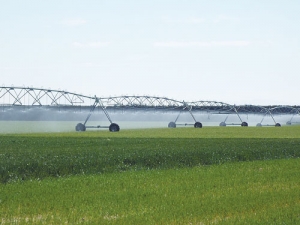Australian teams to help repair North Canterbury irrigators after storm
Moves are afoot to get a team of Australians over here to help repair North Canterbury's irrigation machinery, ravaged by the big windstorm of late October.
 Often little thought is given to maintenance of systems which can have huge benefits in efficient use of water.
Often little thought is given to maintenance of systems which can have huge benefits in efficient use of water.
With the hot, dry weather upon us thoughts turn to irrigation, but often little thought is given to maintenance of systems which can have huge benefits in efficient use of water.
Quinn Elstone, who has many years of experience in the industry working with Valley pivot systems, says "some users haven't changed sprinkler packs in twenty years or more, and technology has moved on a lot since then".
That technology has seen the rise in popularity of low pressure/wide footprint packs whereas the norm was once low pressure/small footprints or overhead sprinkler units running at a typical 30psi. Nowadays 10-15psi is more common which helps reduce ground impact by the water, improves droplet size and offers greater wind resistance.
Modern sprinkler packs are highly accurate and wider, achieving better absorption and helping avert run-off and leaching; most importantly they use less water to achieve optimum yields.
Elstone says farmers should be checking equipment monthly and annually, and while some might see this as an increased cost, over the long term they will save money on water and power costs.
Sprinkler packs should be changed as they approach 10,000 hours use, depending on type, to achieve the best results.
Elstone says the Kiwi 'she'll be right' attitude is typical, and he sees mismatched sprinkler packs used to fix day-to-day problems, with little thought given to system compatibility or operating pressures, resulting in under- or over-watering, the latter causing ponding or run-off for little or no benefit.
According to Ravensdown's most recent Market Outlook report, a combination of geopolitical movements and volatile market responses are impacting the global fertiliser landscape.
Environment Canterbury, alongside industry partners and a group of farmers, is encouraging farmers to consider composting as an environmentally friendly alternative to offal pits.
A New Zealand dairy industry leader believes the free trade deal announced with India delivers wins for the sector.
The Coalition Government will need the support of at least one opposition party to ratify the free trade deal with India.
Primary sector leaders have welcomed the announcement of a Free Trade Agreement between India and New Zealand.
At Pāmu’s Kepler Farm in Manapouri, mating has wrapped up at the across-breed Beef Progeny Test.
President Donald Trump’s decision to impose tariffs on imports into the US is doing good things for global trade, according…
Seen a giant cheese roll rolling along Southland’s roads?